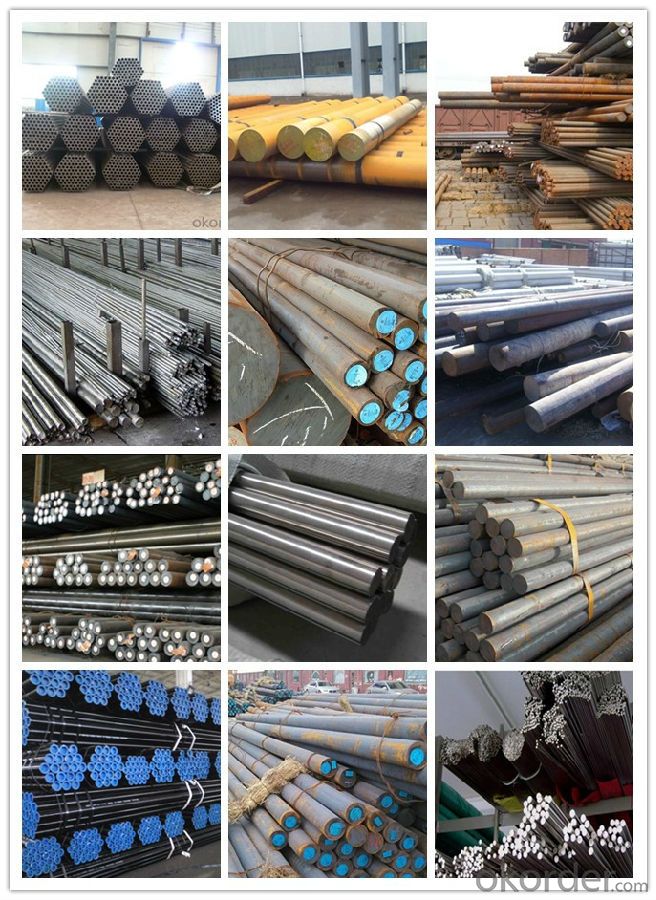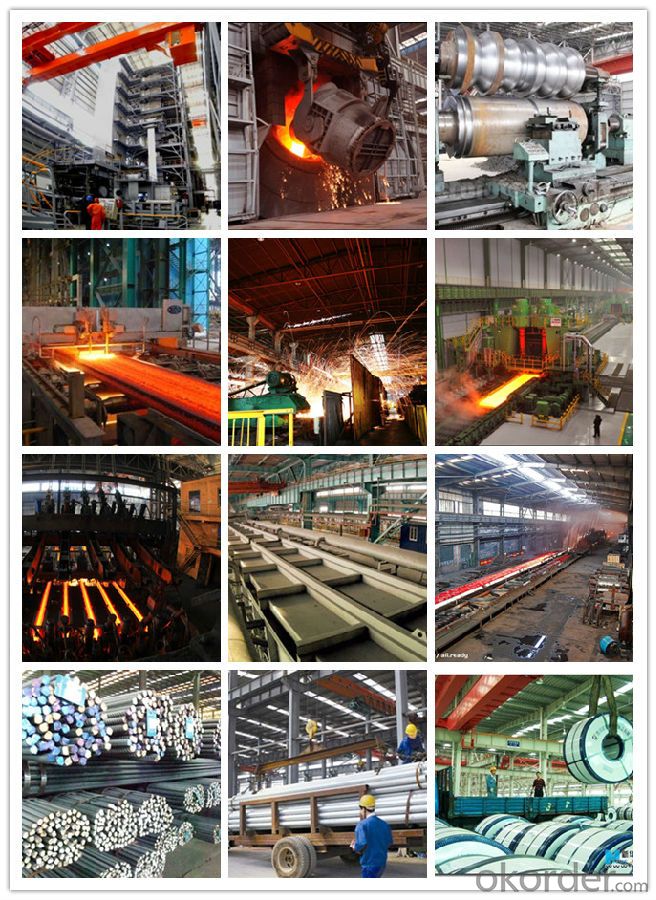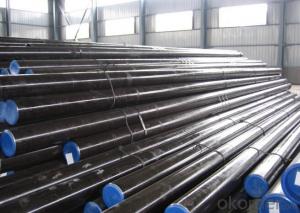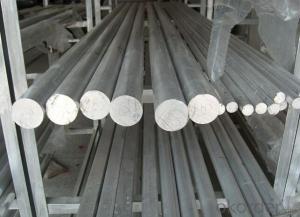Round Bar Alloy Steel SAE5160 Spring Steel Special Steel
- Loading Port:
- China main port
- Payment Terms:
- TT OR LC
- Min Order Qty:
- 30 m.t.
- Supply Capability:
- 10000 m.t./month
OKorder Service Pledge
OKorder Financial Service
You Might Also Like
Item specifice
SAE5160 Spring Steel
1. Material: 65Mn, 60Si2Mn, 50CrVA, SUP-9 etc.
2. Type: Smooth Plain, Double grooved.
3. Specifications: A variety of sizes from 5*45 to 30*150mm. We can produce according to customers' requirements, can customize for you.
4.Features: high strength & toughness; good hardenability & plasticity; excellent decarburization
; strong resistance & good elasticity; perfect machinability
5. Usage: Automobile laminated leaf spring, agricultural machinery & implements(rotary coulter), tools and machines etc.
6. Packing: Standard seaworthy packing or as customer required
7. Application: High strength, high toughness, large sectionand and important modified parts
Product show

Workshop show

Shipping
1. FedEx/DHL/UPS/TNT for samples, Door-to-Door;
2. By Air or by Sea for batch goods, for FCL; Airport/ Port receiving;
3. Customers specifying freight forwarders or negotiable shipping methods!
Delivery Time: 3-7 days for samples; 5-25 days for batch goods.
Payment Terms
1.Payment: T/T, L/C, Western Union, MoneyGram,PayPal; 30% deposits; 70% balance before delivery.
2.MOQ: 1pcs
3.Warranty : 3 years
4.Package Informations: 1) EXPORT, In 20 feet (GW 25 ton) or 40 feet Container (GW 25 ton)
2)as customer's requirement
Main Product
Plastic Mould Steel
DIN 1.2311,1.2738,1.2083,1.2316 etc.
AISI P20,P20+Ni,420 etc.
JIS SUS420J2
Hot Work Steel
DIN 1.2344,1.2343,1.2367,1.2365,1.2581,1.2713 etc.
AISI H13,H11,H10,H21, etc.
JIS SKD61,SKD6,SKD5,SKT4 etc.
Cold Work Steel
DIN 1.2739, 1.2601, 1.2080, 1.2436, 1.2631, 1.263, 1.2510, 1.2327 etc.
AISI D2, D5, D3, D6, A8, A2, O1 etc.
JIS SKD10, SKD11, SKD1, SKS3 etc.
High Speed Steel
DIN 1.3343, 1.3243, 1.3247, 1.3355 etc.
AISI M2, M35, M42, T1 etc.
JIS SKH51, SKH35, SKH59, SKH2 etc.
Alloy Structural Steel
DIN 1.7035,1.6511,1.7220,1.7225 etc.
AISI 5140, 4340, 4135, 4140 etc.
JIS SCr440,SNCM439,SCM435,SCM440 etc.
Stainless & Carbon Steel or Others
DIN 1.4125,1.1191 etc
AISI 440C,1045, 1020 etc.
JIS SUS440C,S45C etc
Why choose us?
(1) The leading exporter in China special steel industry.
(2) Large stocks for various sizes, fast delivery date.
(3) Good business relationship with China famous factories.
(4) More than 7 years steel exporting experience.
(5) Good after-sales service guarantee.
- Q:What are the applications of special steel in the manufacturing supply chain?
- Special steel has a wide range of applications in the manufacturing supply chain. It is commonly used in industries such as automotive, aerospace, construction, and energy. Special steel's high strength, durability, and corrosion resistance make it ideal for manufacturing critical components, such as engine parts, bearings, gears, and structural elements. Additionally, its ability to withstand high temperatures and extreme conditions allows for its use in manufacturing tools, molds, and dies. Overall, special steel plays a vital role in enhancing the performance, reliability, and efficiency of various manufacturing processes and products.
- Q:What are the requirements for special steel used in oil and gas equipment manufacturing?
- Due to the demanding operating conditions and harsh environments that oil and gas equipment encounters, the requirements for special steel used in their manufacturing are extremely strict. These materials must meet several key requirements: 1. Excellent resistance to corrosion is essential for the special steel used in oil and gas equipment. This is particularly important in the presence of corrosive fluids like oil, gas, and saltwater. By preventing degradation and premature failure, corrosion resistance ensures the equipment's longevity. 2. The steel must possess high strength and toughness to withstand the extreme pressures, temperatures, and mechanical stresses encountered during oil and gas operations. This ensures that the equipment can perform reliably in demanding conditions. 3. Special steel used in oil and gas equipment must maintain its mechanical properties and structural integrity even at high temperatures, as these processes often involve elevated temperatures. 4. Weldability is an important aspect of special steel used in oil and gas equipment manufacturing. It should allow for efficient and reliable welding processes without compromising the equipment's overall strength and integrity. 5. Good fatigue resistance properties are necessary for special steel used in oil and gas equipment, as cyclic loading can lead to fatigue failure if the material is not designed to withstand repetitive stresses. 6. In applications like offshore drilling or arctic environments, where extremely low temperatures are encountered, the special steel should exhibit excellent toughness and ductility to prevent brittle fracture. 7. The chemical composition of the special steel must be tightly controlled to ensure consistent and predictable material properties. This involves strict control over the levels of various alloying elements, impurities, and trace elements to meet the specific requirements of the oil and gas industry. Meeting these requirements is crucial for the safe and reliable operation of oil and gas equipment. Special steel manufacturers collaborate closely with industry standards and specifications to develop and provide materials that meet these demanding requirements, ensuring the integrity and performance of the equipment in the oil and gas sector.
- Q:What are the different methods of surface polishing for special steel?
- There are several methods of surface polishing for special steel, each with its own advantages and applications. Some of the commonly used methods include mechanical polishing, electrochemical polishing, and chemical polishing. 1. Mechanical Polishing: This method involves the use of abrasive materials to remove surface imperfections and create a smooth and reflective surface. It can be done manually or using automated polishing machines. Mechanical polishing is effective for removing scratches, dents, and other surface defects. It is commonly used in industries such as automotive, aerospace, and precision engineering. 2. Electrochemical Polishing: Also known as electrolytic polishing, this method uses an electrolyte solution and an electric current to dissolve and remove surface material. Electrochemical polishing can provide a high level of surface smoothness and can be particularly useful for complex shapes and hard-to-reach areas. It is commonly used in industries such as medical devices, semiconductors, and jewelry manufacturing. 3. Chemical Polishing: This method involves the use of chemical solutions to selectively remove surface material and create a smooth finish. Chemical polishing is effective for removing oxide layers, stains, and contaminants. It is often used for stainless steel and other corrosion-resistant alloys. The process involves immersing the steel in a chemical bath and controlling factors such as temperature, concentration, and time to achieve the desired surface finish. 4. Electropolishing: Electropolishing is an electrochemical process that combines the benefits of electrochemical and chemical polishing. It involves the application of an electric current to remove surface material while simultaneously dissolving it in an electrolyte solution. Electropolishing can provide a highly smooth, clean, and corrosion-resistant surface finish. It is commonly used for stainless steel and other alloys in industries such as pharmaceutical, food processing, and semiconductor manufacturing. 5. Vibratory Polishing: This method utilizes vibrating media, such as ceramic chips or abrasive pellets, along with a polishing compound to remove surface imperfections. The steel parts are placed in a vibratory tumbler or bowl where the continuous movement causes the media to rub against the parts, resulting in a polished surface. Vibratory polishing is commonly used for small or delicate parts and can be an efficient and cost-effective method. Overall, the choice of surface polishing method for special steel depends on factors such as the desired surface finish, part geometry, material properties, and industry requirements. It is important to consider these factors and consult with experts or specialists to determine the most suitable method for a specific application.
- Q:What are the challenges in heat treating special steel?
- Some of the challenges in heat treating special steel include achieving the desired hardness and strength while maintaining dimensional stability, avoiding distortion or warping, controlling grain growth and microstructure, and ensuring proper heat distribution and uniformity throughout the material. Additionally, special steel alloys may have unique properties that require specific heat treatment techniques or specialized equipment, adding complexity to the process.
- Q:What are the factors to consider when selecting special steel for a specific application?
- When selecting special steel for a specific application, there are several important factors to consider: 1. Mechanical properties: The mechanical properties of the steel, such as strength, hardness, toughness, and ductility, are crucial in determining its suitability for a particular application. It is important to match the steel's mechanical properties to the specific requirements of the application to ensure optimal performance and safety. 2. Corrosion resistance: Depending on the application, it is essential to consider the steel's resistance to corrosion. Different environments, such as marine, chemical, or high-temperature conditions, may require specific corrosion-resistant alloys or coatings to ensure the longevity and reliability of the steel in service. 3. Temperature resistance: The ability of the steel to withstand high or low temperatures without losing its mechanical properties is crucial in many applications. Factors such as thermal expansion, thermal conductivity, and resistance to thermal fatigue must be considered to ensure the steel can perform effectively in the intended environment. 4. Weldability and fabricability: If the steel needs to be welded or fabricated into complex shapes, the ease of weldability and fabricability becomes an important factor. Some steels may require specialized welding techniques or preheating to avoid cracking or distortion during fabrication. 5. Cost: Cost is also a key consideration when selecting special steel for a specific application. It is important to balance the desired properties of the steel with the available budget to ensure cost-effectiveness without compromising performance or safety. 6. Availability: The availability of the chosen steel grade in the required form, size, and quantity is another critical factor. It is important to ensure that the selected steel can be easily sourced and obtained within the required timeframe to avoid project delays or cost overruns. 7. Compliance with standards and specifications: Depending on the industry or application, there may be specific standards, specifications, or regulations that the steel must comply with. It is essential to select a steel grade that meets these requirements to ensure compliance and maintain the necessary certifications or approvals. By considering these factors, engineers and manufacturers can make an informed decision when selecting special steel for a specific application, ensuring optimal performance, durability, and safety.
- Q:How does special steel contribute to the transportation equipment industry?
- The transportation equipment industry relies heavily on special steel for several reasons. To begin with, special steel alloys are utilized in the manufacturing of various vehicle components, including engine parts, suspension systems, and transmission components. These alloys possess exceptional strength, durability, and resistance to corrosion, ensuring that vehicles can withstand harsh operating conditions and have a longer lifespan. Furthermore, special steel is crucial in the production of railway tracks and infrastructure, which greatly contributes to the efficiency and safety of transportation systems. The high-quality steel used in railway tracks ensures stability, reduces maintenance requirements, and improves overall railway performance. Moreover, special steel is employed in the manufacturing of aircraft components, where precision, reliability, and lightness are of utmost importance. Steel alloys with outstanding mechanical properties are utilized in critical parts like landing gear, engine components, and structural elements, guaranteeing the safety and efficiency of air transport. Additionally, special steel plays a vital role in shipbuilding and the production of marine vessels. The use of corrosion-resistant steel alloys in shipbuilding helps to prevent rusting, extending the lifespan of vessels and reducing maintenance costs. Moreover, certain steel alloys with a high strength-to-weight ratio allow for the construction of lighter ships, resulting in increased fuel efficiency and reduced emissions. In summary, special steel's exceptional properties and characteristics make it an essential material in the transportation equipment industry. It enhances the performance, safety, and durability of vehicles, railways, aircraft, and ships, ultimately improving the efficiency and reliability of transportation systems.
- Q:What are the different processes involved in making special steel?
- The different processes involved in making special steel include melting, refining, and alloying of the raw materials, followed by casting, rolling, and heat treatment to achieve the desired properties and composition.
- Q:What are the different methods for improving the corrosion resistance of special steel?
- There are several methods for improving the corrosion resistance of special steel. 1. Alloying: One of the most common methods is to add alloying elements to the steel composition. These elements, such as chromium, nickel, and molybdenum, form a protective layer on the surface of the steel, preventing corrosion. Stainless steel, for example, contains a high amount of chromium, which forms a passive film that protects the steel from corrosive environments. 2. Surface treatments: Various surface treatments can be applied to special steel to enhance its corrosion resistance. These treatments include electroplating, hot-dip galvanizing, and chemical passivation. Electroplating involves coating the steel with a layer of metal, such as zinc or nickel, which acts as a sacrificial anode, protecting the steel from corrosion. Hot-dip galvanizing involves immersing the steel in molten zinc, forming a durable, corrosion-resistant coating. Chemical passivation involves treating the steel with a solution that removes surface impurities and forms a protective oxide layer. 3. Protective coatings: Applying protective coatings can significantly improve the corrosion resistance of special steel. Coatings such as paint, epoxy, or polyurethane can act as a barrier, preventing moisture and corrosive substances from coming into contact with the steel surface. These coatings can be applied by spray, dip, or powder coating methods. 4. Heat treatment: Heat treatment can modify the microstructure of special steel, improving its corrosion resistance. Processes such as annealing, quenching, and tempering can alter the steel's properties, making it more resistant to corrosion. Heat treatment can also relieve internal stresses, which can contribute to corrosion. 5. Environmental control: Controlling the environment in which the special steel is used can also help improve its corrosion resistance. This includes measures such as maintaining proper humidity levels, controlling pH, avoiding exposure to corrosive chemicals, and implementing effective ventilation systems. By minimizing the exposure of special steel to corrosive elements, its corrosion resistance can be enhanced. Overall, a combination of these methods can be employed to improve the corrosion resistance of special steel, ensuring its longevity and performance in corrosive environments.
- Q:How does special steel perform in high-temperature creep?
- Special steel is specifically designed to perform well in high-temperature creep conditions. Creep refers to the tendency of a material to deform under constant stress over time at elevated temperatures. Special steel exhibits excellent resistance to creep due to its unique composition and heat treatment processes. The alloying elements used in special steel, such as chromium, nickel, and molybdenum, significantly enhance its high-temperature strength and creep resistance. These alloying elements form stable carbides and improve the material's ability to retain its structural integrity even at elevated temperatures. Furthermore, special steel is often subjected to specific heat treatment methods, such as annealing or quenching and tempering, to further enhance its creep resistance. These processes help in refining the microstructure of the steel, reducing the presence of internal stresses, and improving its overall mechanical properties. The combination of alloying elements and heat treatment processes in special steel provides it with exceptional creep resistance. It can withstand prolonged exposure to high temperatures without significant deformation or failure. This makes special steel an ideal choice for applications that involve high-temperature and high-stress conditions, such as gas turbines, petrochemical plants, and power generation facilities. Overall, the performance of special steel in high-temperature creep is outstanding, and it is widely recognized as a reliable and durable material for applications requiring resistance to thermal deformation and long-term stability under constant stress.
- Q:How does special steel perform in cryogenic environments?
- Special steel performs exceptionally well in cryogenic environments. Cryogenic temperatures refer to extremely low temperatures below -150°C (-238°F), and special steel is specifically designed to withstand and excel in such conditions. One of the key properties of special steel is its ability to maintain its strength and toughness even at low temperatures. Unlike other materials that become brittle and prone to fractures in cryogenic environments, special steel retains its mechanical properties, ensuring structural integrity and reliability. This characteristic is crucial in applications where safety is paramount, such as in the aerospace and nuclear industries. Moreover, special steel exhibits excellent resistance to corrosion and oxidation, even at cryogenic temperatures. This resistance is essential as cryogenic environments often involve the presence of gases, liquids, or chemicals that can accelerate corrosion. Special steel's resistance to corrosion ensures its longevity and minimizes the risk of material degradation, thereby enhancing the overall performance and lifespan of equipment or structures. In addition to its mechanical and corrosion-resistant properties, special steel also possesses good thermal conductivity. This property allows for efficient heat transfer, which is particularly important in cryogenic environments where temperature control and management are critical. The ability of special steel to efficiently conduct heat ensures that equipment and structures remain at the desired low temperatures without any significant thermal variations. Furthermore, special steel's suitability for cryogenic environments is evident in its wide range of applications. It is commonly used in cryogenic storage tanks for liquefied gases, such as liquid oxygen, nitrogen, and argon. Special steel is also employed in the construction of cryogenic pipelines, valves, and other components, where its exceptional performance ensures the safe transport and containment of cryogenic fluids. In conclusion, special steel performs exceptionally well in cryogenic environments due to its retained strength and toughness, resistance to corrosion, good thermal conductivity, and wide range of applications. Its ability to withstand extreme cold temperatures makes it a reliable and preferred choice for various industries requiring dependable performance in cryogenic conditions.
1. Manufacturer Overview |
|
|---|---|
| Location | |
| Year Established | |
| Annual Output Value | |
| Main Markets | |
| Company Certifications | |
2. Manufacturer Certificates |
|
|---|---|
| a) Certification Name | |
| Range | |
| Reference | |
| Validity Period | |
3. Manufacturer Capability |
|
|---|---|
| a)Trade Capacity | |
| Nearest Port | |
| Export Percentage | |
| No.of Employees in Trade Department | |
| Language Spoken: | |
| b)Factory Information | |
| Factory Size: | |
| No. of Production Lines | |
| Contract Manufacturing | |
| Product Price Range | |
Send your message to us
Round Bar Alloy Steel SAE5160 Spring Steel Special Steel
- Loading Port:
- China main port
- Payment Terms:
- TT OR LC
- Min Order Qty:
- 30 m.t.
- Supply Capability:
- 10000 m.t./month
OKorder Service Pledge
OKorder Financial Service
Similar products
New products
Hot products
Hot Searches
Related keywords




























